BAR HARBOR—On Tuesday, the Bar Harbor Town Council unanimously approved the Cruise Ship Disembarkation Ordinance’s rules. The ordinance will go into effect in 30 days and limits the amount of cruise ship disembarkations to 1,000 a day. This ordinance was approved by voters in November 2022.
The Council also officially resolved to schedule a workshop on potentially amending the new cruise ship ordinance, which is being called “track two.”
The two tracks caused some confusion amongst the approximately twenty members of the public who attended a joint Planning Board and Town Council workshop before the Council meeting.
Council Chair Valerie Peacock said that the second track would require the town to repeal or amend the land use ordinance, which the voters approved in November 2022. A portion of the ordinance would be stricken and replaced with the Council-created ordinance. Those changes would be workshopped with the Planning Board, have public discussion, and then be voted on in November by the voters.
The voters could approve those changes to the cruise ship ordinance or not. What those changes might be (if they would change daily limits to monthly, black out days, use licenses vs permits to establish caps, use contracts to establish caps, what those capped numbers would be or are based on) is currently not established. Establishing what they might be is part of the process, which has officially only just begun.
According to Town Manager James Smith, those original rules (track one) capping daily disembarkations to 1,000 will be in effect during this “track two” process. They will be implemented and applied. If the voters do not approve track two, the limits originally voted in (and the process around them) will stand. If this track fails to gather voters’ approval in November, track one, the cruise ship ordinance approved by voters in 2022 will still be in effect.
If Track 2 moves forward, then the Track 1 is no longer needed because the town will have voted to move in a slightly different direction to cure some challenges in the LUO that are outside the Council’s prerogative, Smith said. The goals, he said, were to make the ordinance more tenable and help ease the legal disputes.
TRACK ONE
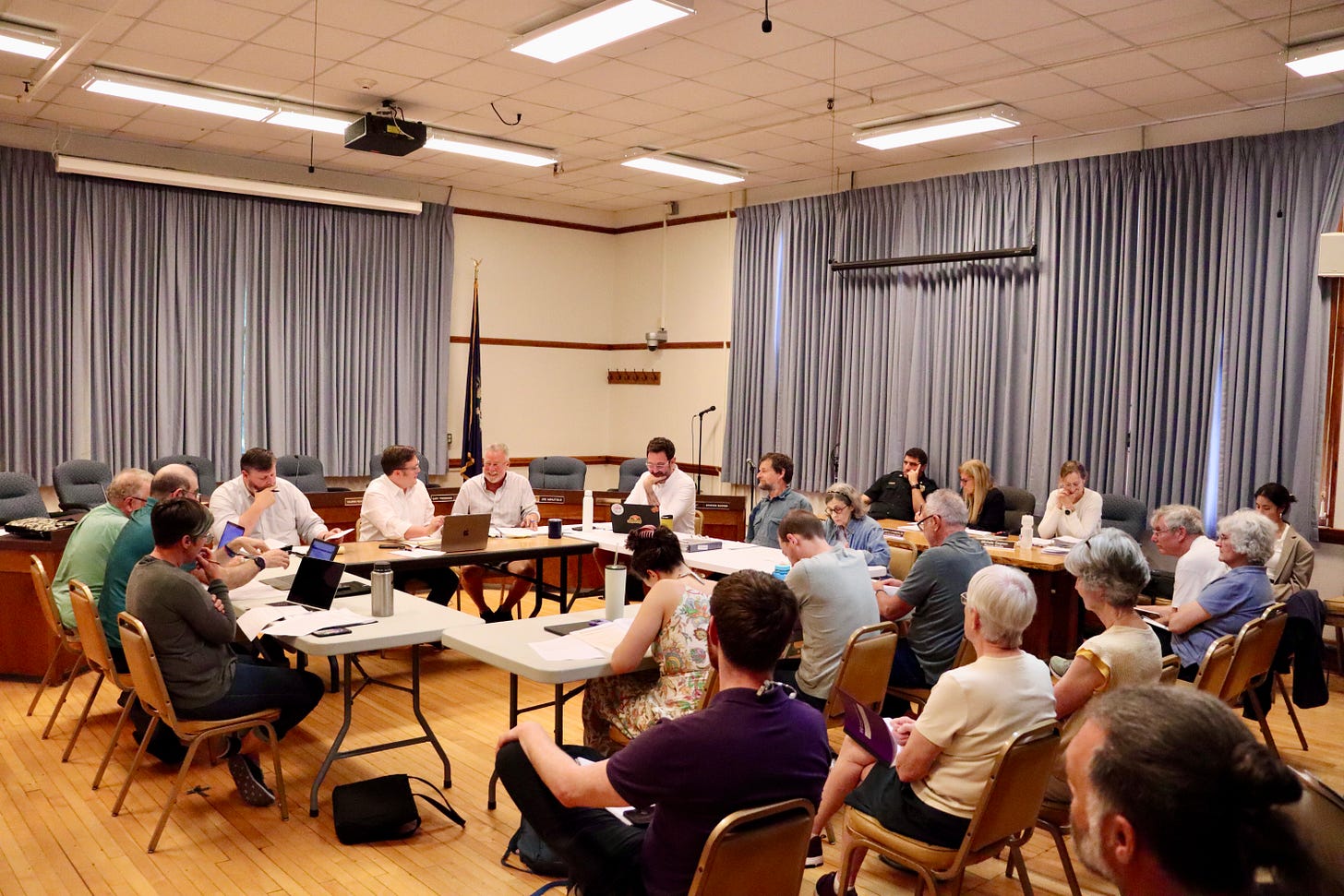
The first track is the Cruise Ship Disembarkation Ordinance, which is embedded in the town’s land use ordinance because that is how it was written. This was the ordinance approved in November 2022, and it is the ordinance that the town was sued over in federal court by some area businesses, Association to Prevent and Protect Local Livelihoods (APPLL) and the Penobscot Bay and River Pilots Association. It was upheld in a February 29 decision by Judge Lance Walker.
The town is also being sued by the citizen's petition lead author and the defendant intervenor in that federal court case, Charles Sidman. That suit focuses on a March 6 Council statement about the ordinance’s enforcement.
There were questions about when the implementation would begin and what date would be used. Those questions weren’t explicitly answered.
Earlier on Tuesday, Sidman sent an email to the Council referencing his recent commentary in the Mount Desert Islander and also expressing his displeasure at how Monday’s discussions did not include him and that he believes that the offer of inclusion would have only come if he agreed to not “seek redress from the courts.”
Sidman requested a delay implementing the ordinance until the public saw the permitting applications, which have been created by staff. Though those two different permits would not be codified as part of the ordinance, in the interest of transparency, he thought that they should be shown and action delayed until those permits are presented to the Council and public.
“The forms could be prepared to nullify the intent of the whole ordinance,” Sidman said and added that it would bring a great deal of comfort to see them though earlier versions accomplished the intent of the ordinance.
Town Attorney Stephen Wagner (of Rudman Winchell) said it was a reasonable request. Smith said the forms are usually staff created and amended.
“The person whose talking about us delaying is asking us to delay,” Peacock said.
“You now have, I think, all litigants on all sides asking for more time before you adopt this,” Smith told the Council.
Despite that, the motion passed unanimously. The Council said they didn’t need to see the applications in a public setting. The ordinance was adopted.
TRACK TWO
Prior to the Council meeting, some councilors met in a workshop with Planning Board members. They also met Thursday night to discuss the process the Council started, which could create potential changes to the town’s land use ordinance that would deal with the cruise ship ordinance approved by voters in November 2022. That process is a first step in a possible second track to lowering cruise ship visits to the town.
It caused some confusion among some of those attending.
Because of potential additional litigation and what the town says will be difficulties in enforcing the land use ordinance, the Council is pursuing that second track of limiting cruise ship disembarkations.
What this second track might be is still up for discussion, but the two boards will have to move quickly to have it on the November 2024 ballot, which is a stated goal.
That track could be what Councilor Earl Brechlin referred to in May as creating better regulatory tools on the ballot in November and getting a more definitive statement on what the community wants to do.
Peacock and Smith have also stressed that any changes would work toward the goals of reducing visitation, lessen governing by litigation, and increase public input and transparency.
The second track would involve public hearings and interactions, the Council has said. So far, it has also involved meetings with the litigants in the federal suit. Those occurred on Monday.
At the workshop, John Kelly said that the second track didn’t seem to honor the referendum, but Smith said that they are still trying to find a path forward that resolves challenges and that the public can support at the “ballot box.”
Others attending worried about definitions being clarified and well defined and whether the changes apply to all districts in town. Some requested the town look into tendering itself.
Planning Board Vice Chair Ruth Eveland said that changing the town’s land use ordinance is an iterative process. When things don’t work as well as they should, they can change it, she said. “This is the opportunity to take the first step to make a fix.”
At its meeting, the Council voted unanimously to proceed with that second track.
A preliminary summary meant to “help frame discussions” says that “limits may include: caps of cruise ships per day, daily caps based on total lower berth capacity, monthly caps based on total lower berth capacity, blackout days and months.”
The current ordinance has caps are daily and on disembarkations. Lower berth capacity refers to the standard double occupancy numbers of a room within the ship.
LEGAL COSTS
The costs of defending the ordinance and the councilor’s March decision has been adding up.
“That’s a phenomenal amount of money for a town this size,” Council Vice Chair Gary Friedmann said of spending $400,000 on legal expenses, and he added that the cost alone tells him why the town should be pursuing alternatives for litigation.
“Every time we look up, there’s another thing coming at us right now,” Peacock said.
A CALL FROM THE COAST GUARD
While the town was implementing the Cruise Ship Ordinance and working on the second track process, it was also tweaking the Harbor Ordinance, which had been moved forward as a package for the rules, but according to Wagner is “really separate from the cruise ship ordinance.”
Wagner said that at 4:30 p.m., on Tuesday, just before the joint workshop, the town received an email and phone call from the chief legal counsel from the United States Coast Guard, raising concerns from both ordinances, specifically safety concerns, asking them to delay action.
They’d also received letters from the pilots about the legality of the Harbor Ordinance and additional litigation could arise from it.
“They have asked the Council, as of tonight, to not take action on the Harbor Ordinance,” Wagner said.
“We can just lay this one aside, talk to the Coast Guard, regroup,” Peacock said.
This is what the Council did. The group took no action on the ordinance.
Wagner clarified that the Port and Harbor Ordinance amendment was moved forward as a package.
“This Port and Harbor Ordinance amendment really came out from an incident a year or so ago,” he said, and it’s separate from the Cruise Ship Disembarkation Ordinance.
That incident was when a small cruise ship owned by American Cruise Line failed to get approval from the town’s harbormaster and docked. It was fined $885, which is the passenger fee of $5.21 per person for a berth capacity of 170, and the company agreed to not anchor its ships in Bar Harbor waters again without a confirmed reservation
ADDITIONAL INFORMATION
CRUISE SHIP ORDINANCE - TRACK ONE (FROM COUNCIL PACKET)
MATERIAL FROM JOINT WORKSHOP
ORDER TO SCHEDULE WORKSHOP FOR AMENDMENT (FROM WORKSHOP)
ORDER REQUESTING PLANNING BOARD TO CONSIDER AMENDMENT (FROM WORKSHOP)
PORT AND HARBOR ORDINANCE AMENDMENT (FROM COUNCIL PACKET)
All photos: Shaun Farrar/Bar Harbor Story
LINKS TO LEARN MORE
To read the packet, click here.
LINKS TO LEARN MORE
Town Cruise Ship Information page.
A Parallel Track, A Return To the Public:
If you’d like to donate to help support us, you can, but no pressure! Just click here.





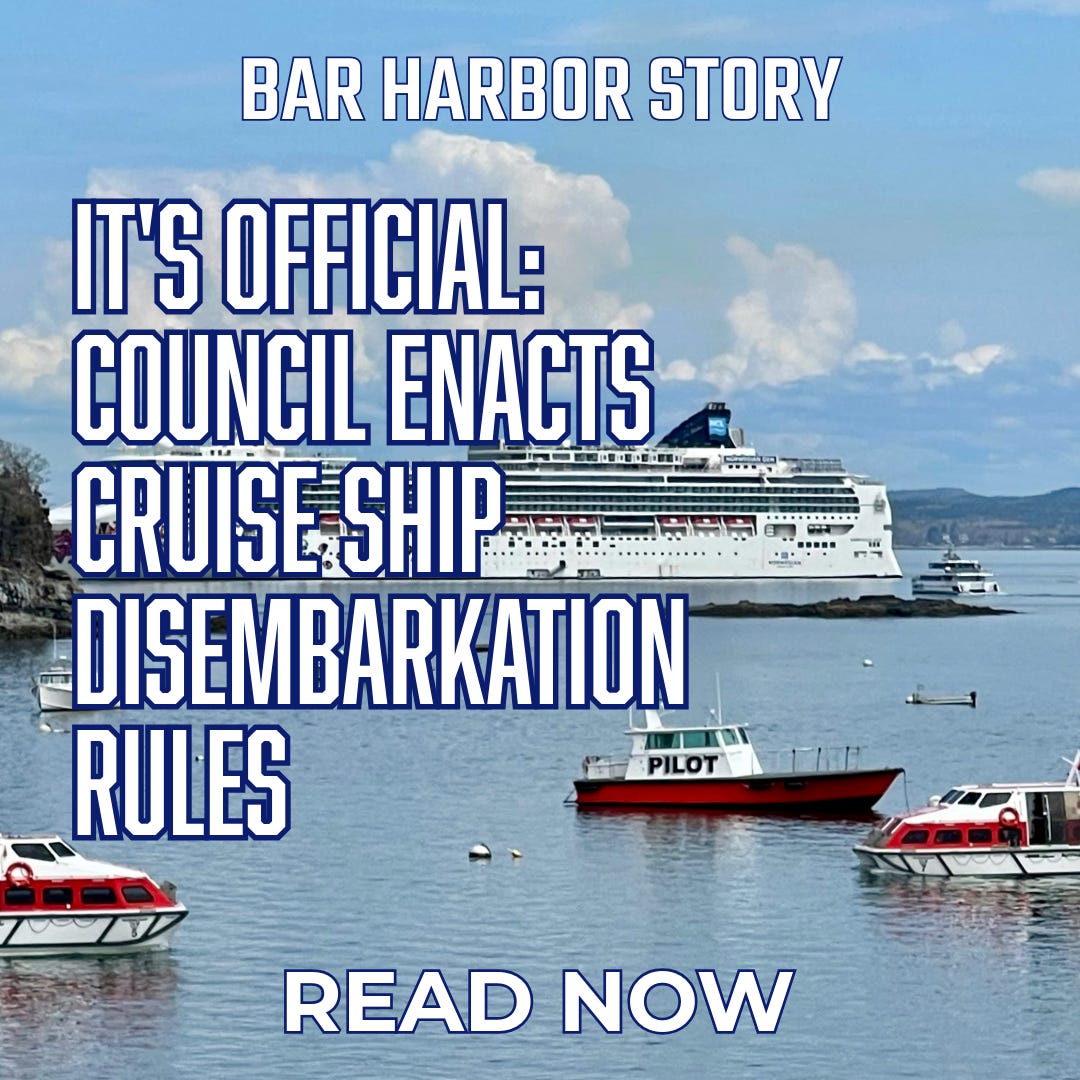
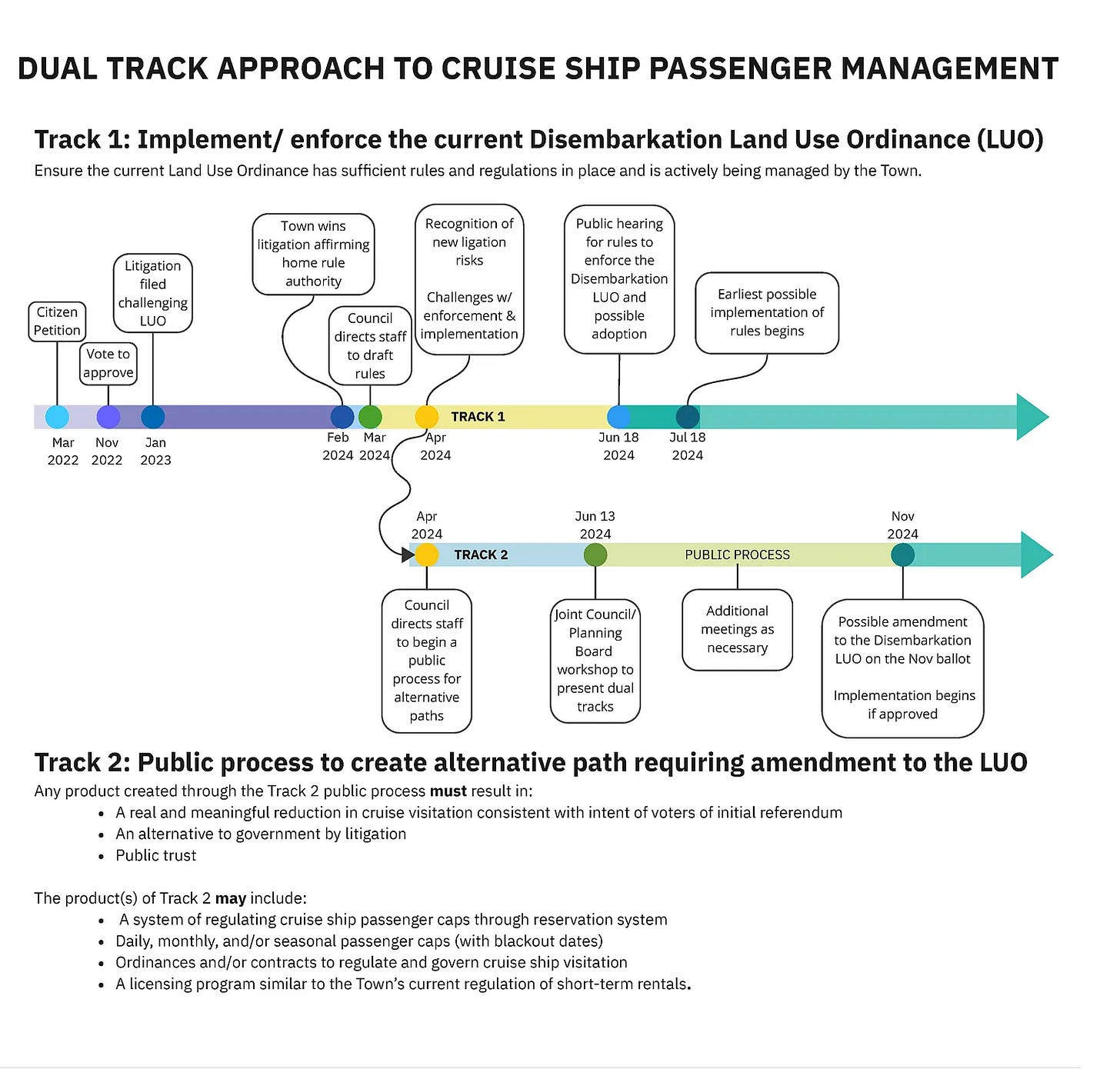
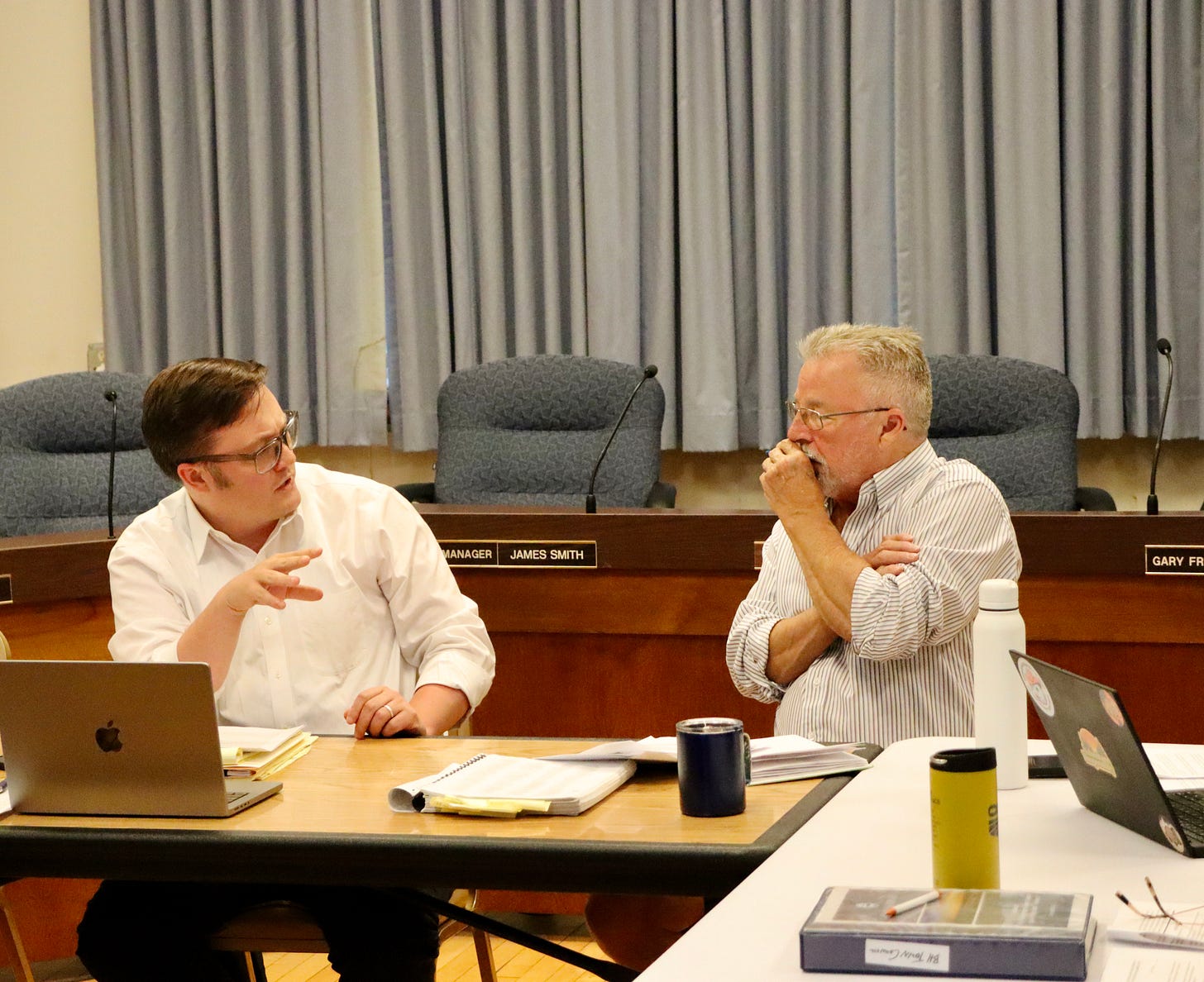

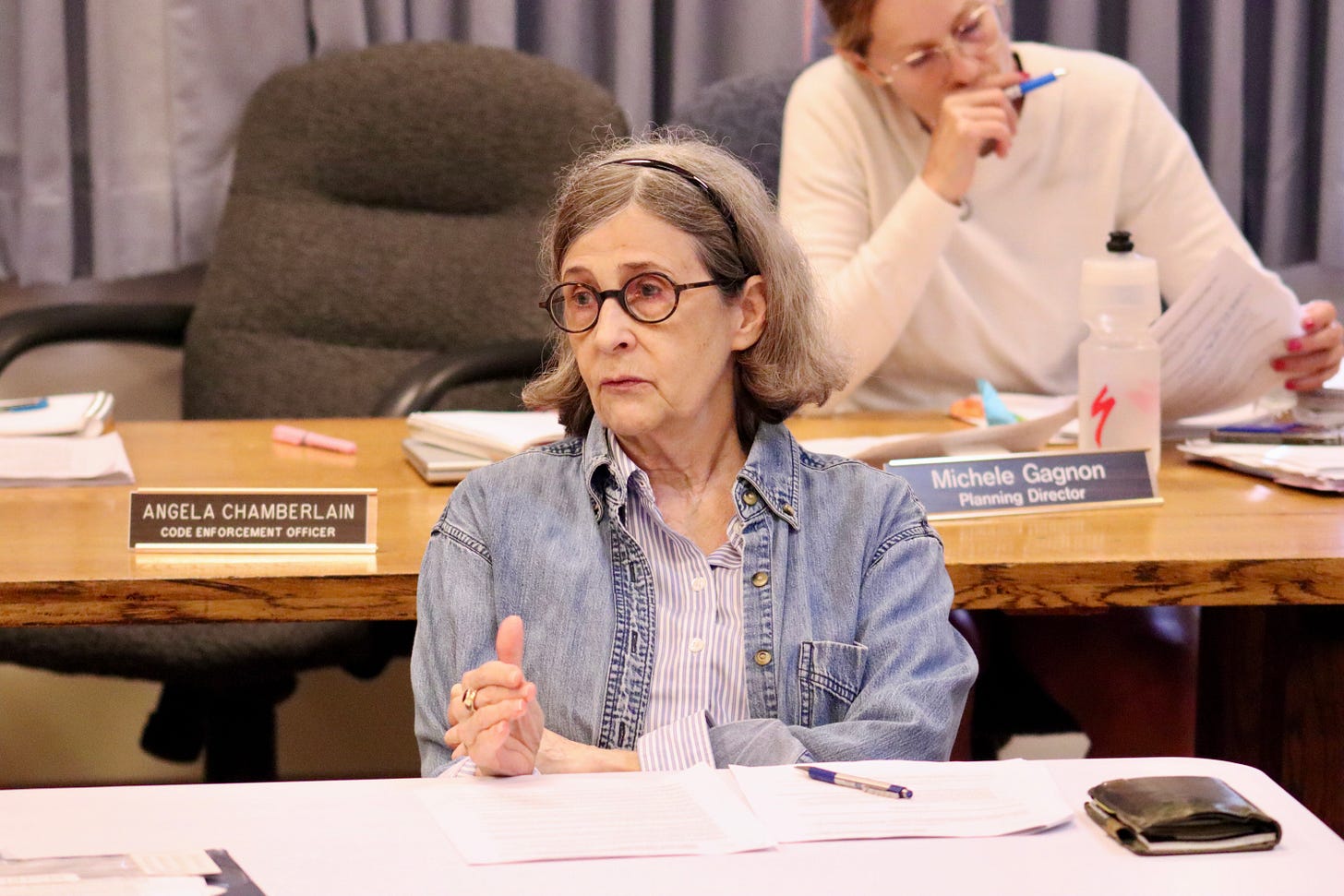



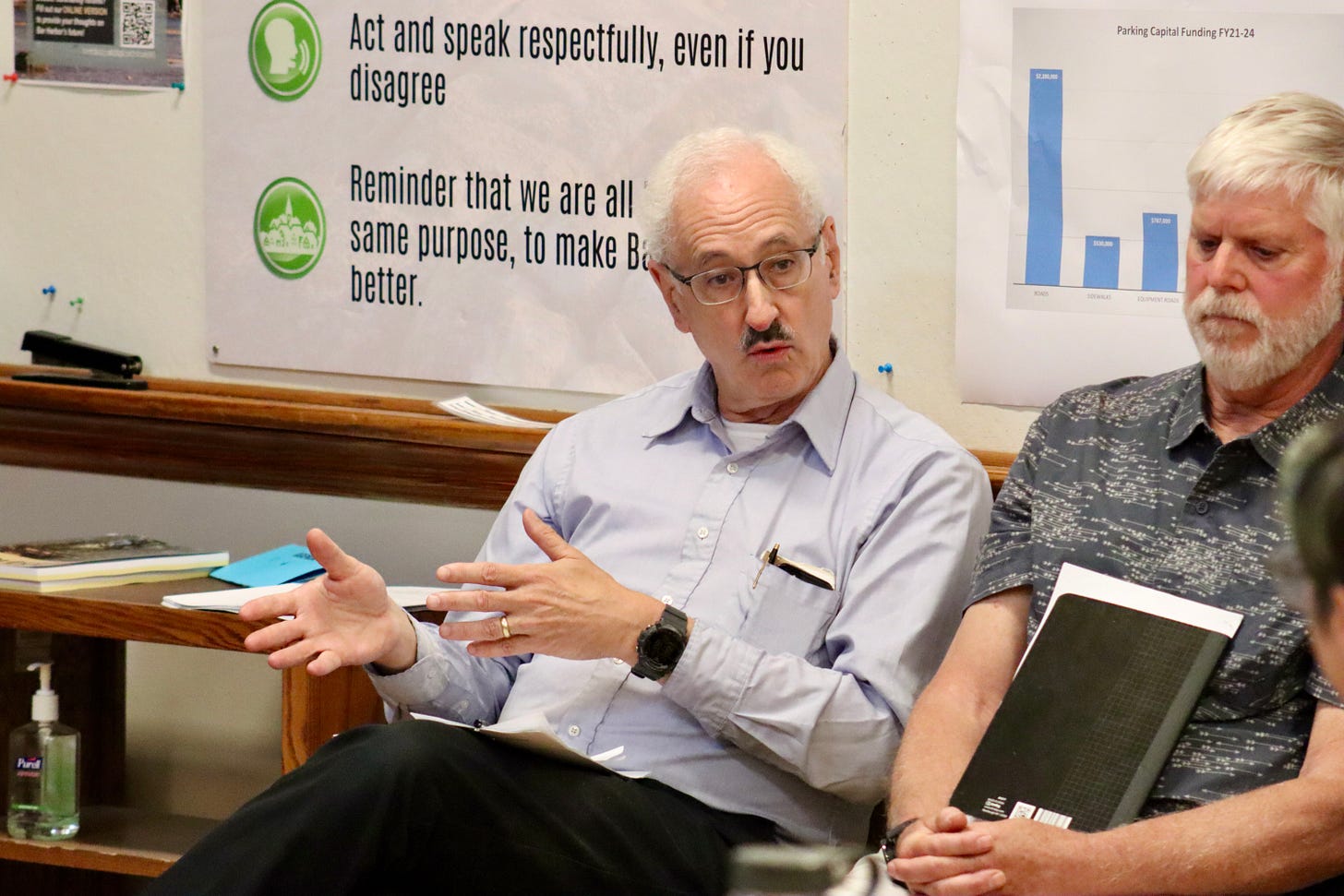

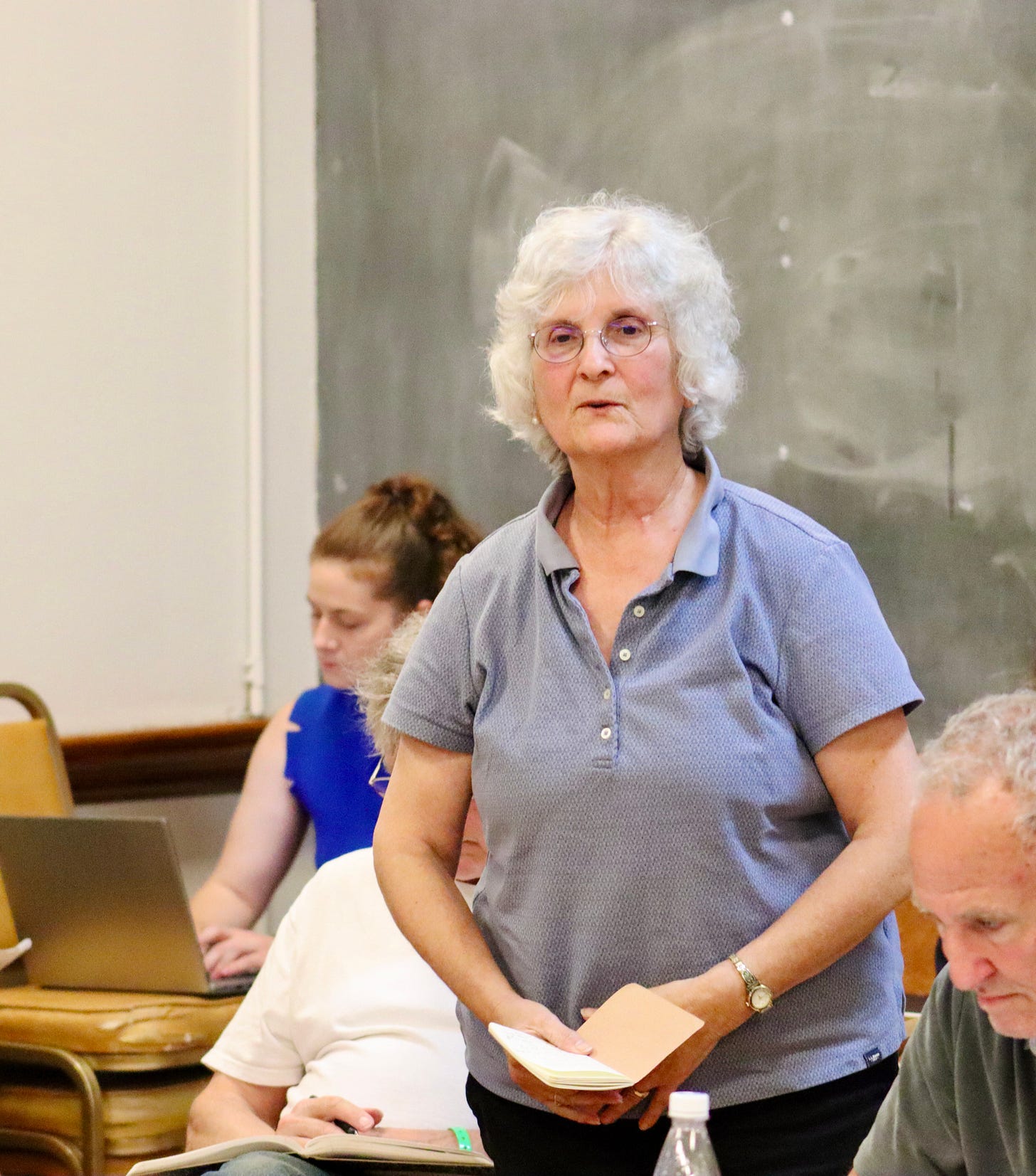
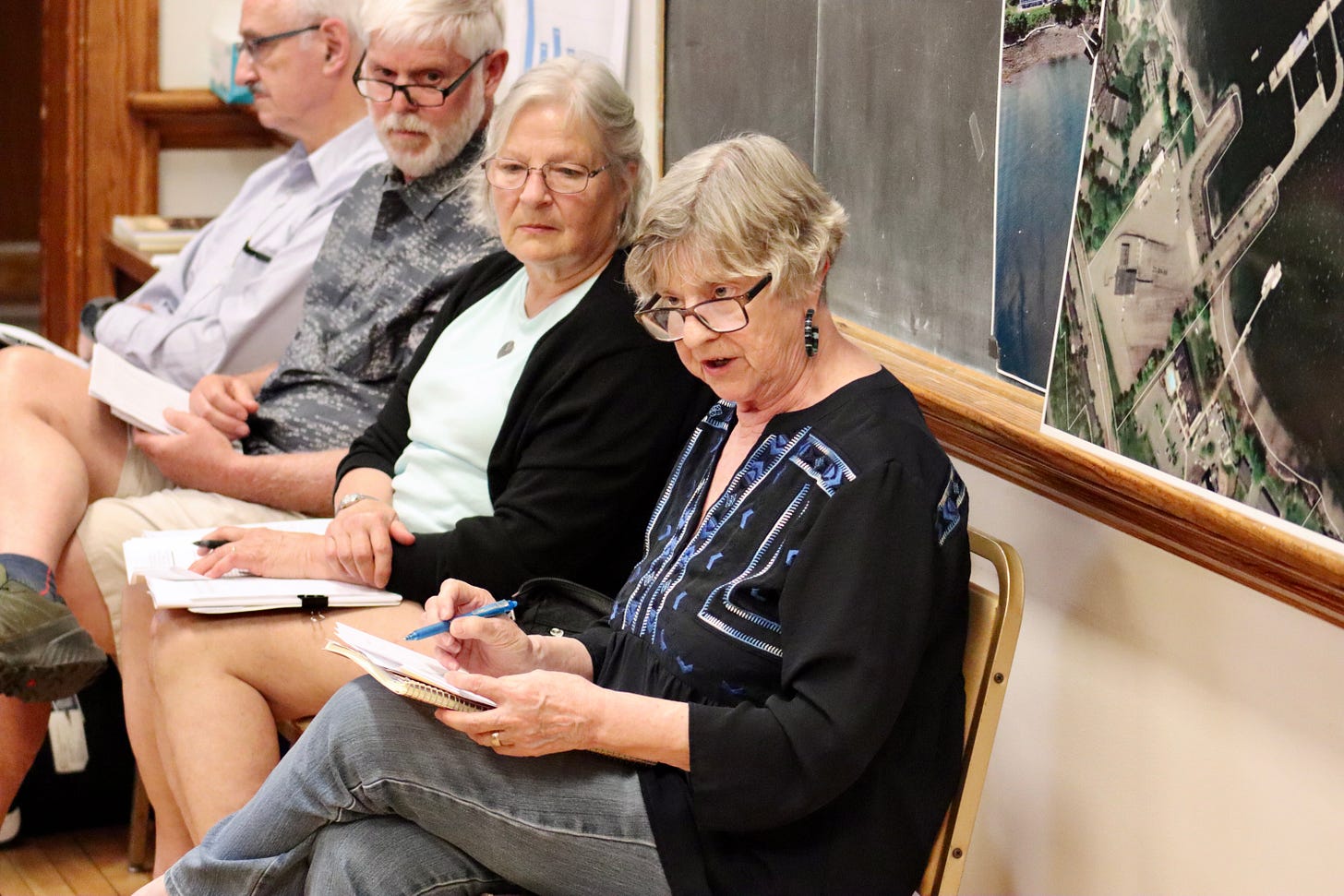





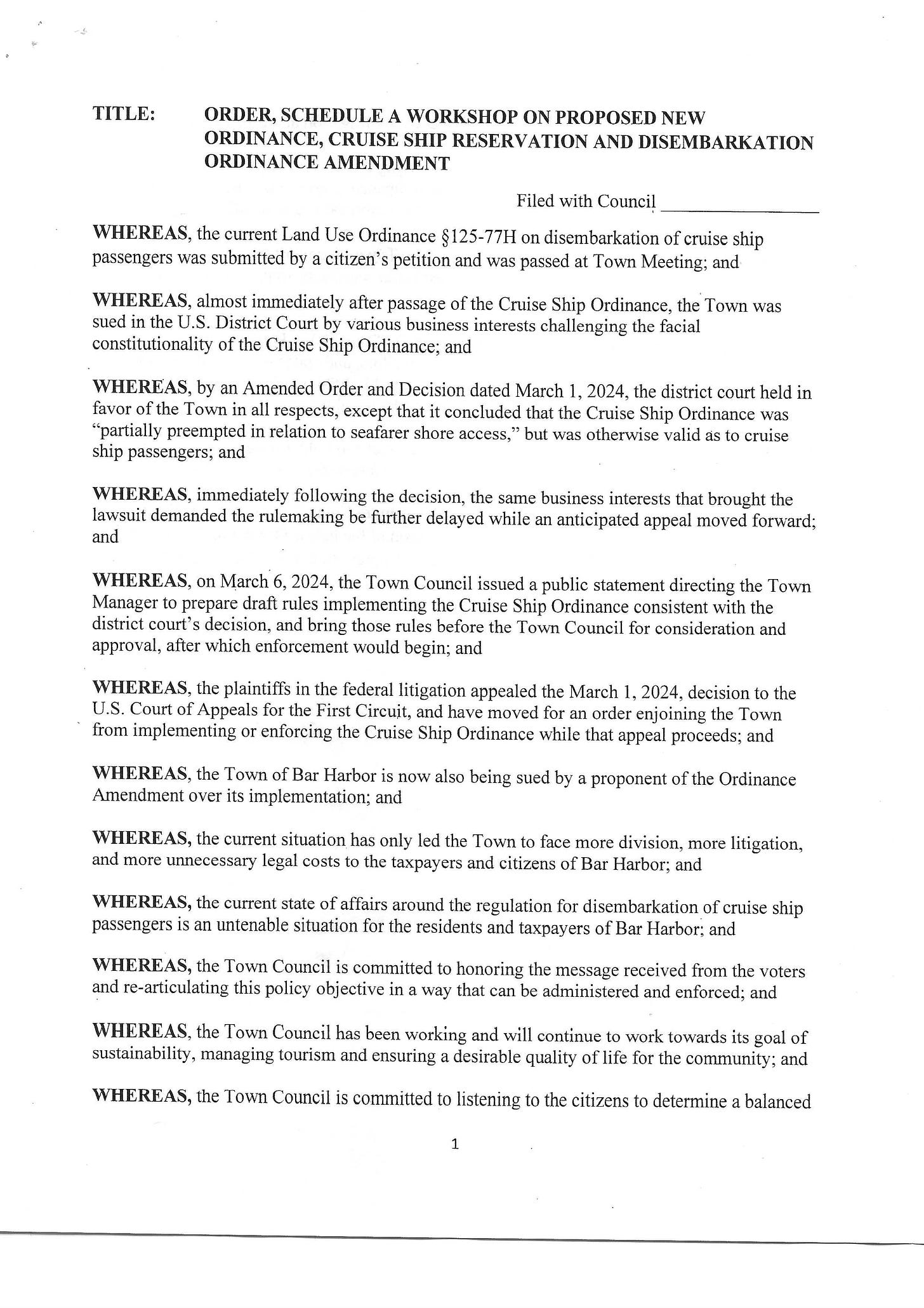
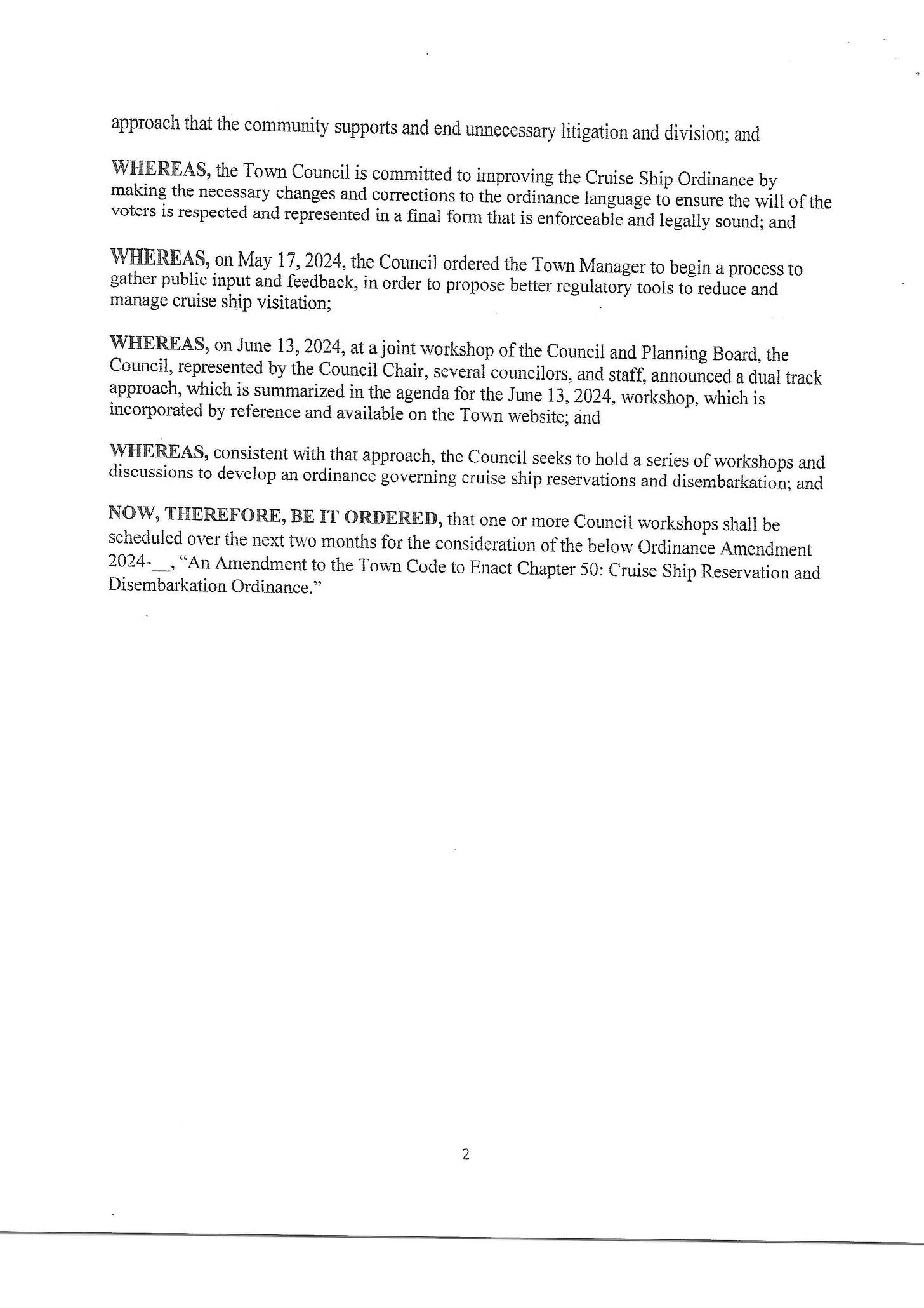
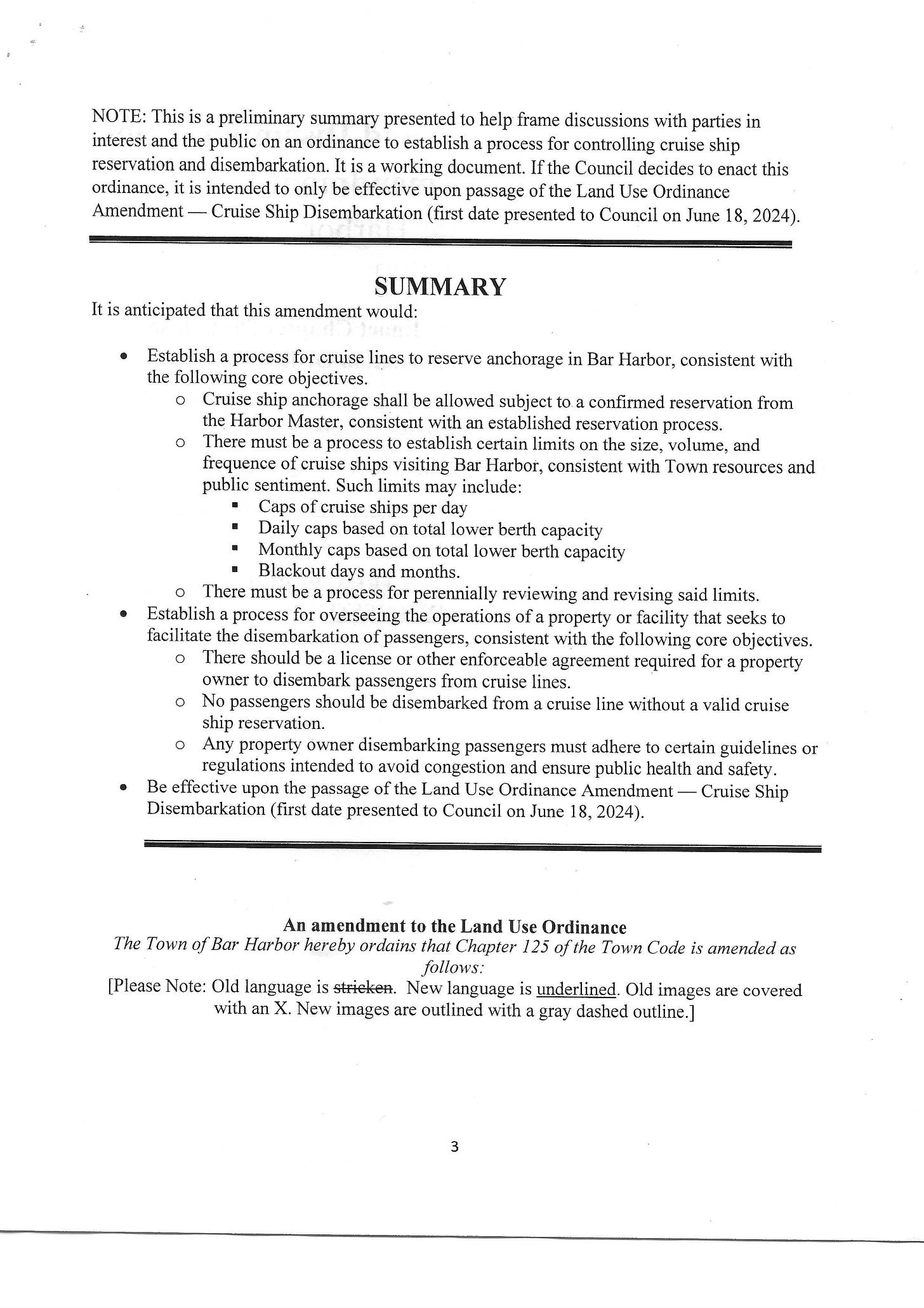
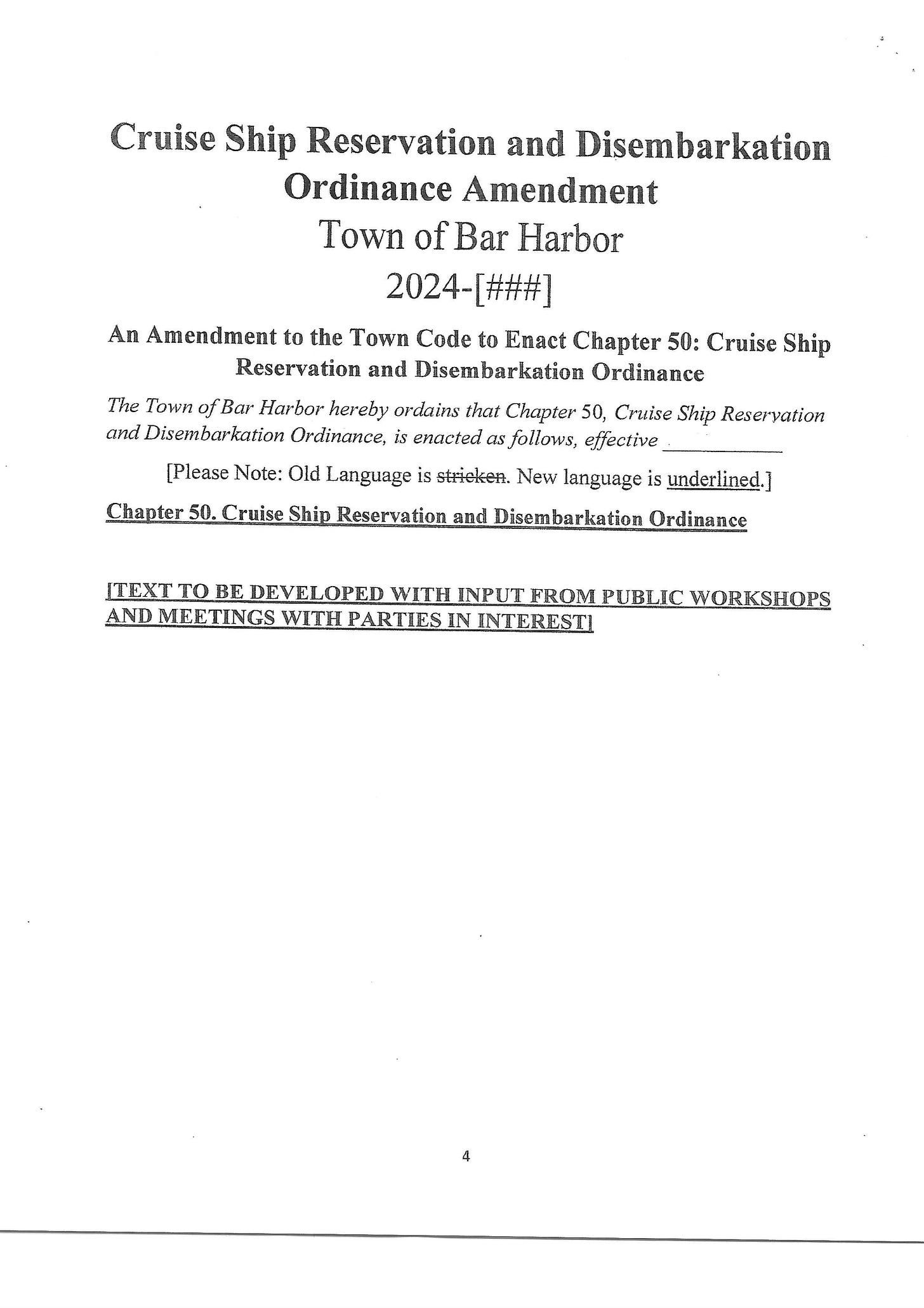
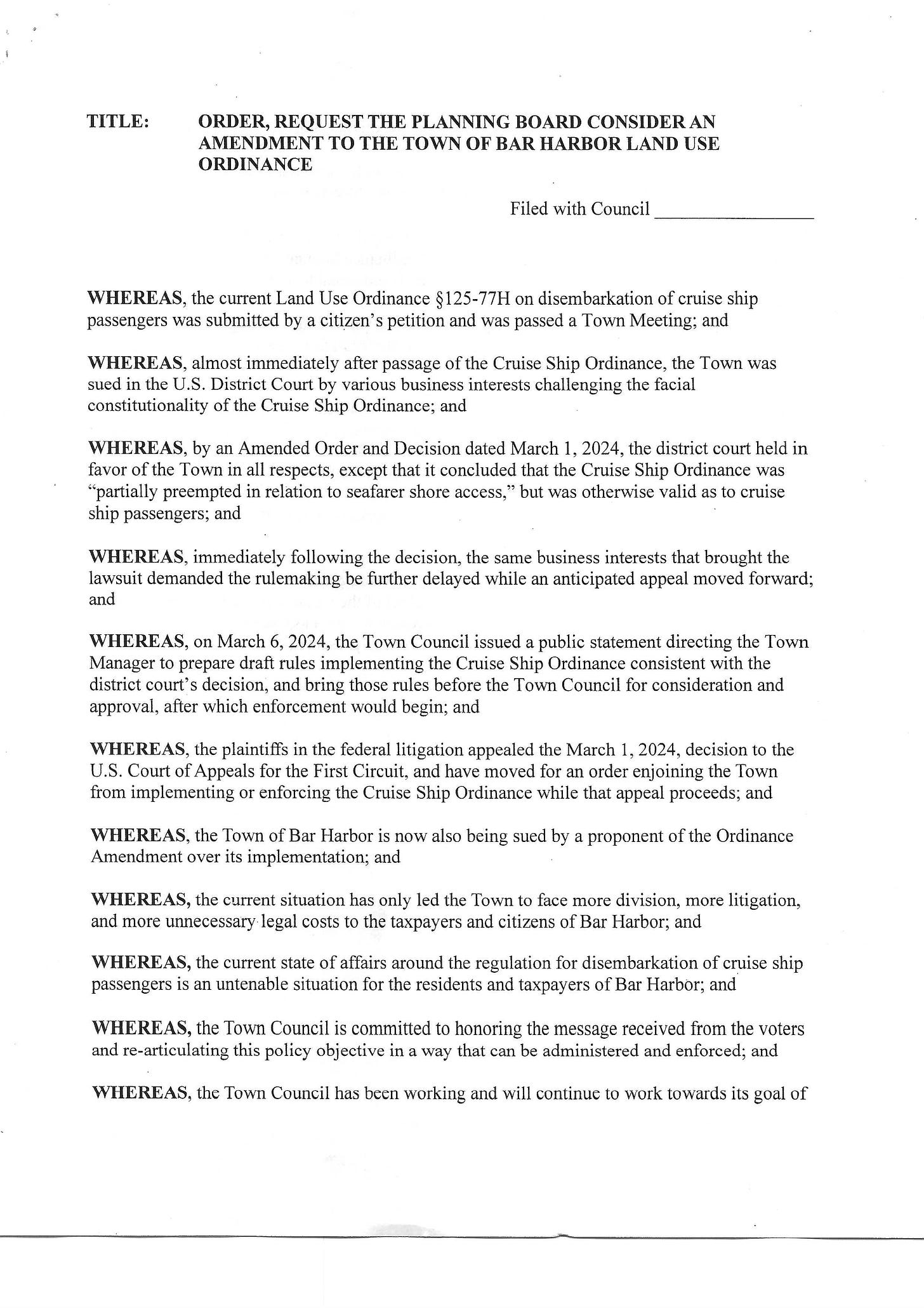
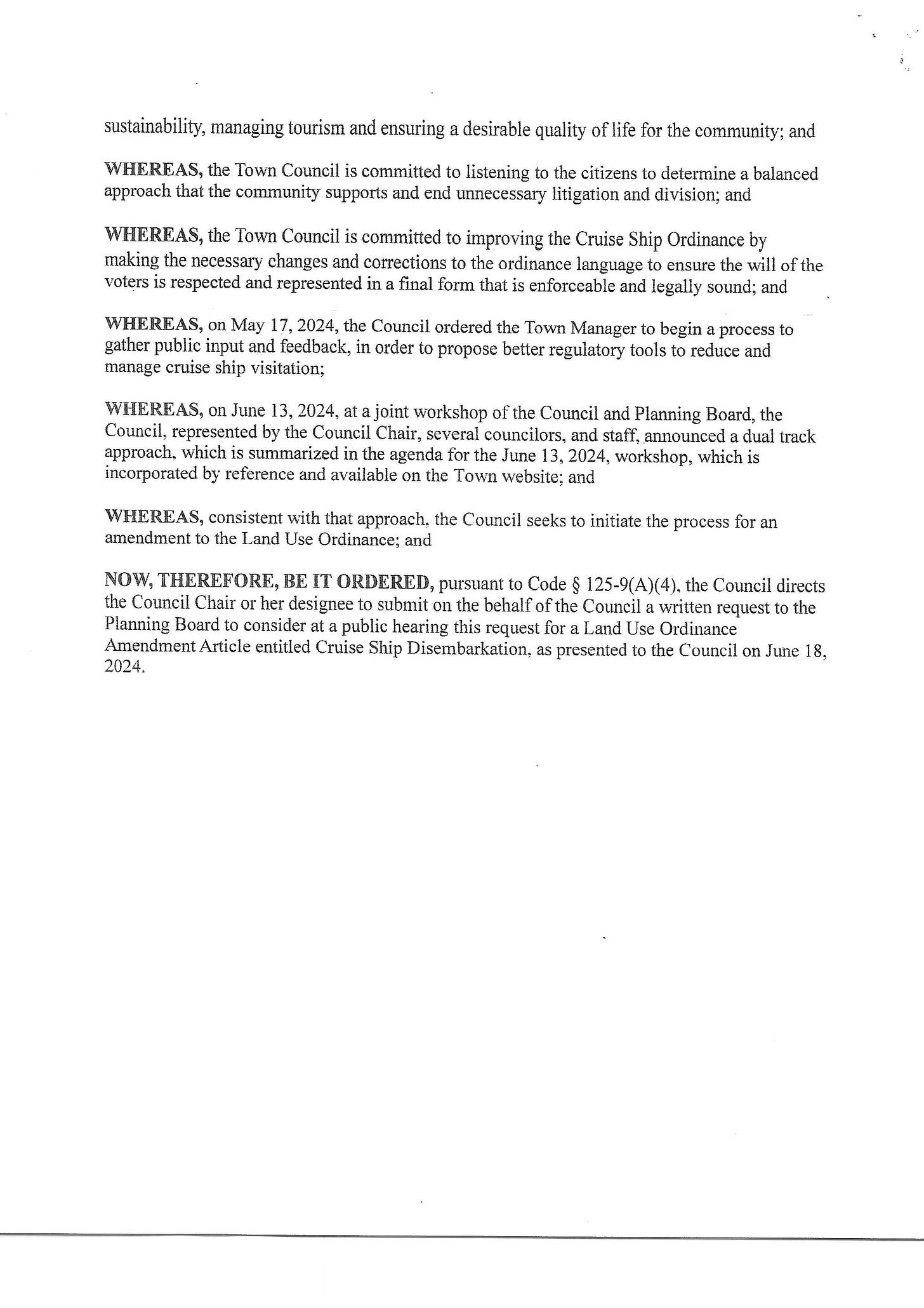
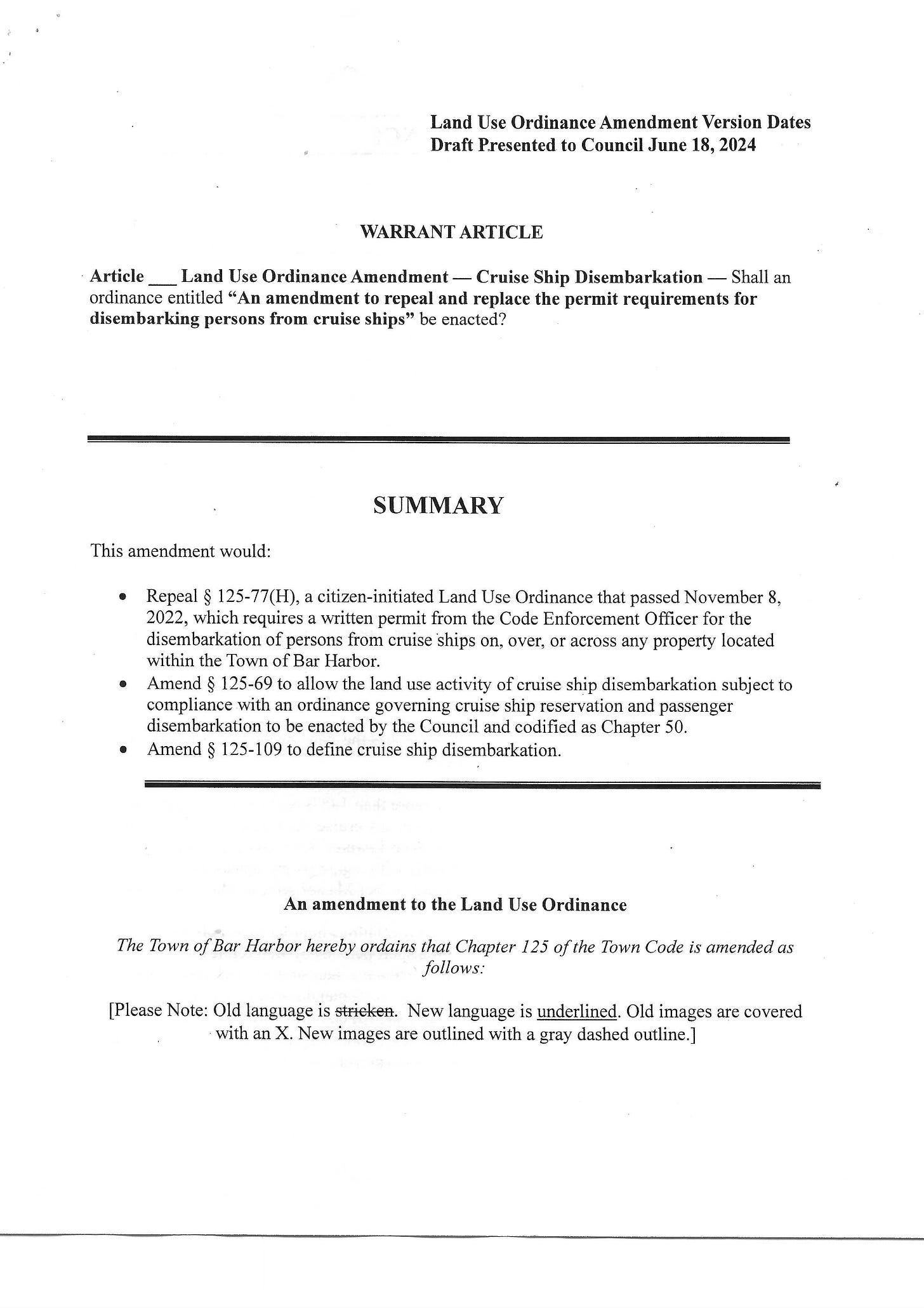
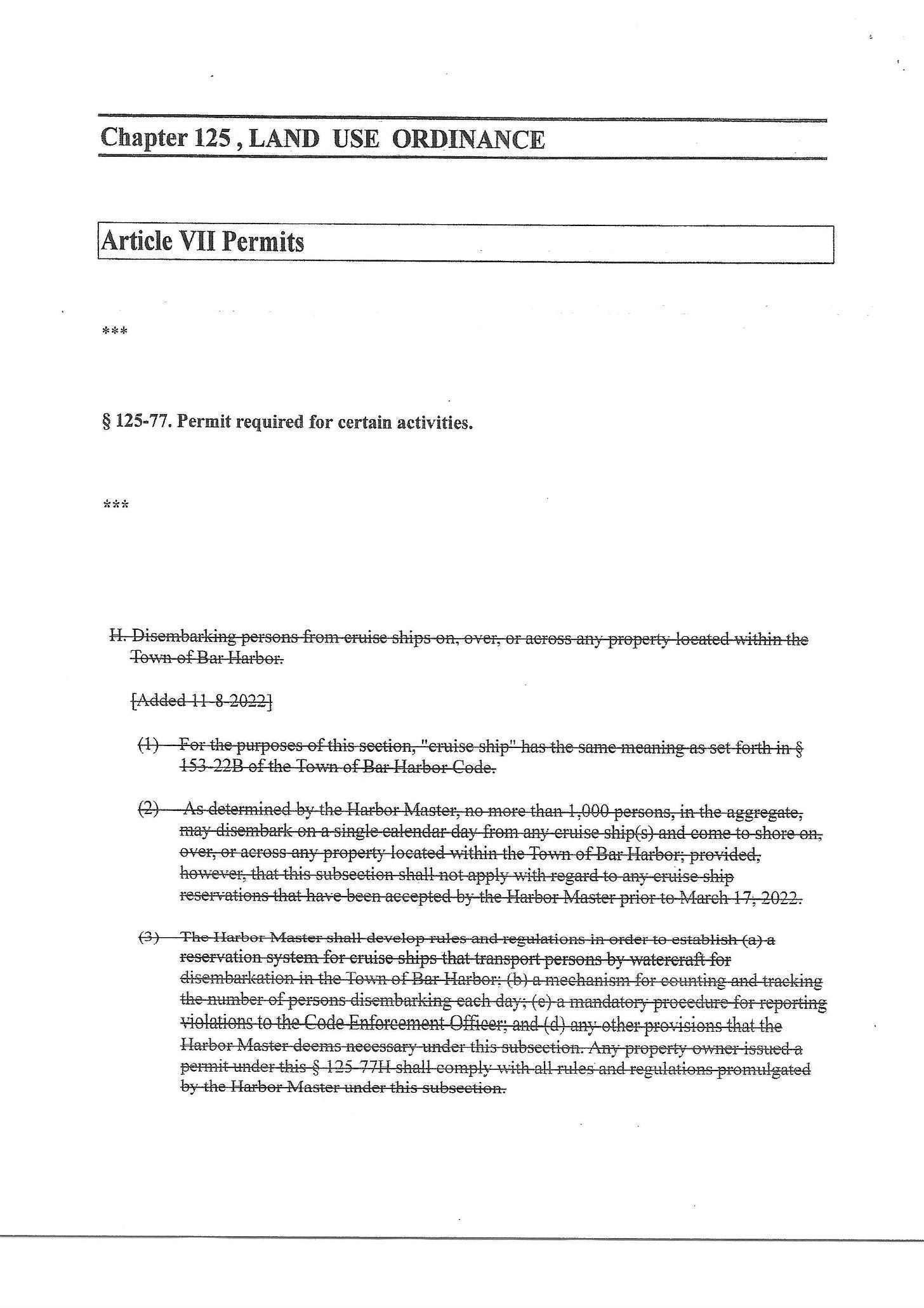
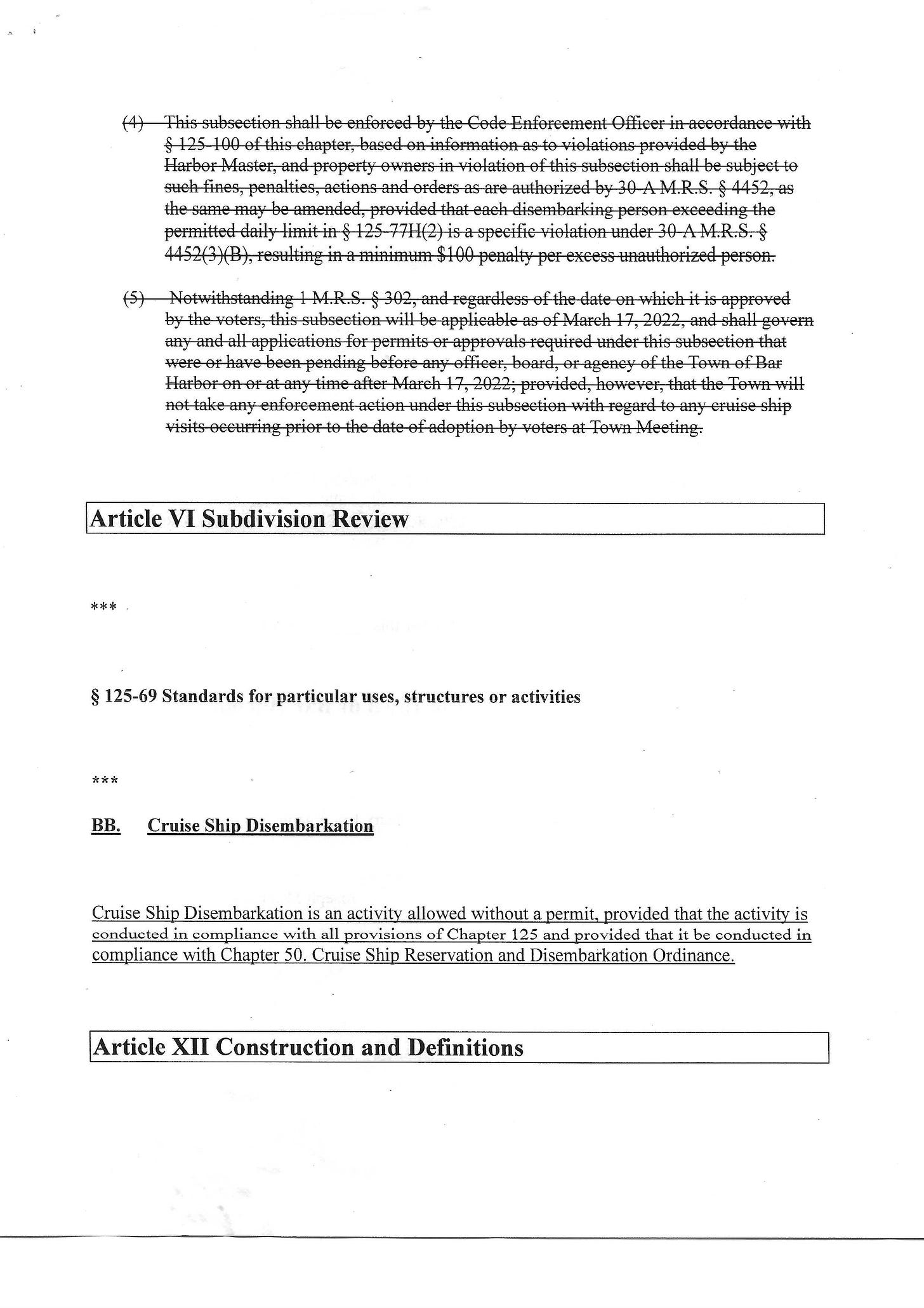
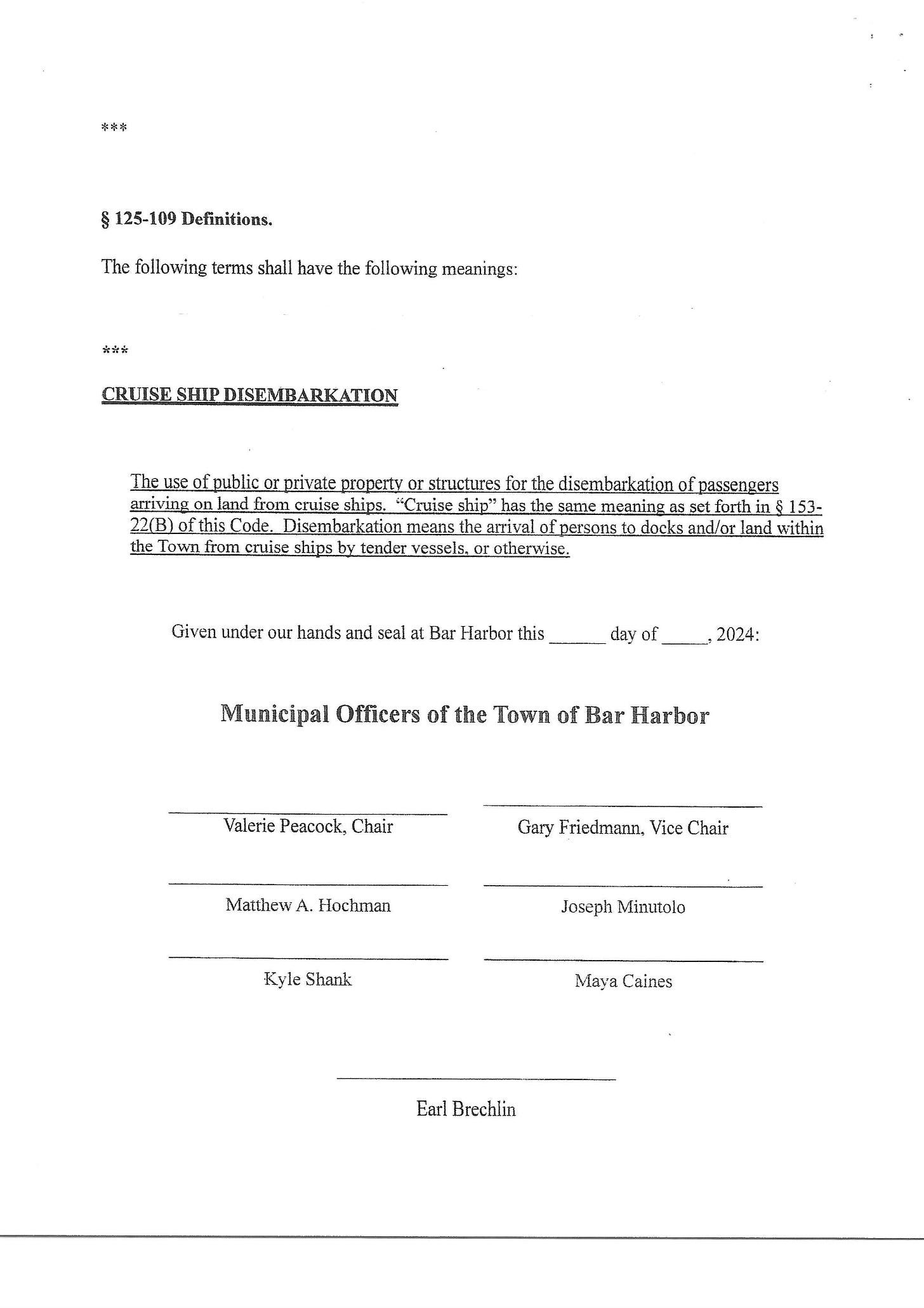



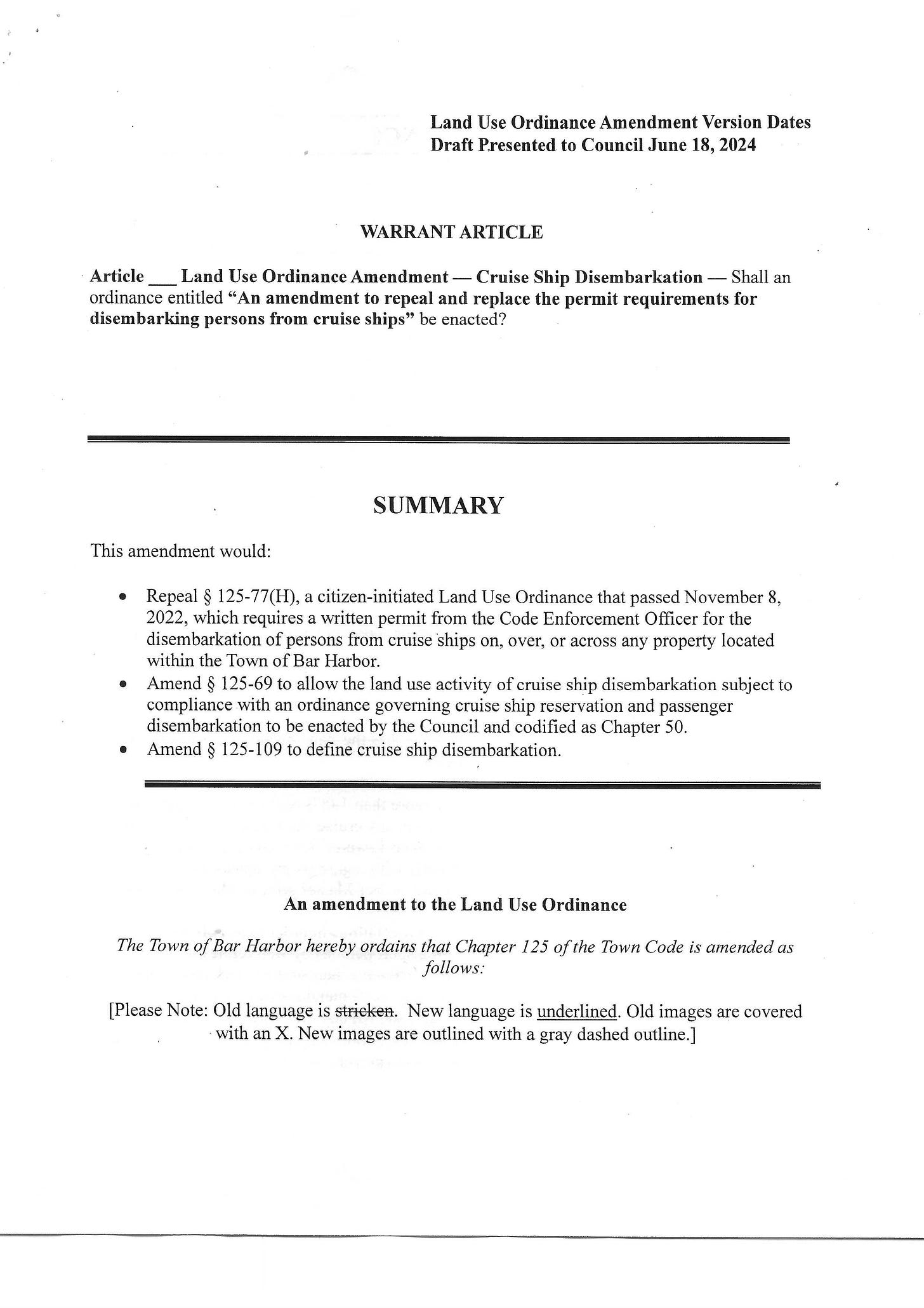
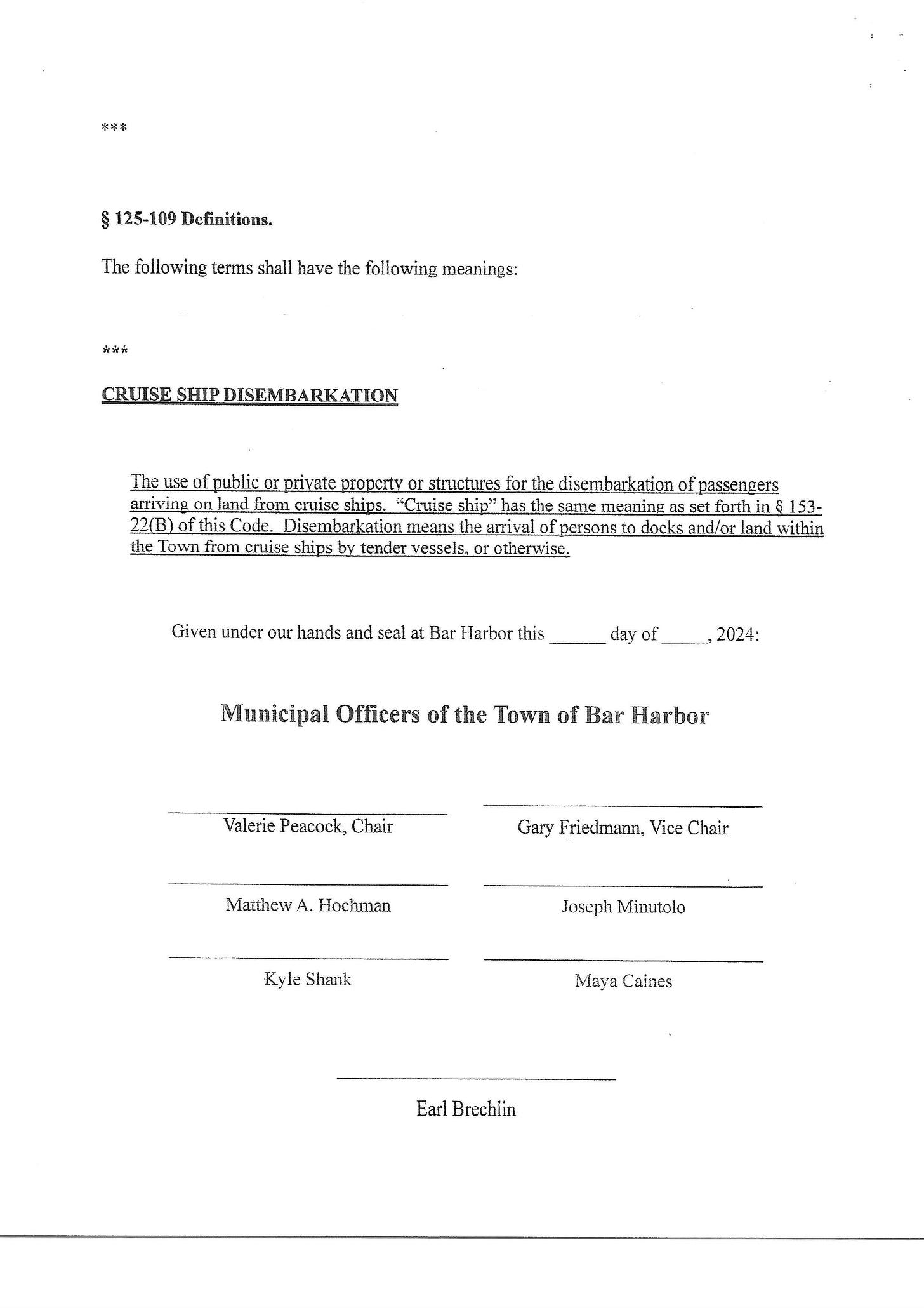
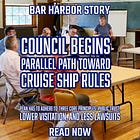
Just imagine. A Bar Harbor Town Council in tune with residents' concerns about the negative impact of excessive cruise ship tourism. With such a town council, there would have been no need for a Citizens Initiative.
Just imagine. A Bar Harbor Town Council understanding the Citizens Initiative as a wake up call and a spur to making proactive plans to implement it should it pass.
Just imagine. A Bar Harbor Town Council which once the Citizens Initiative passed with overwhelming support, sprung into action to implement what was now the law.
Just imagine. A Bar Harbor Town Council, which defends Bar Harbor residents and rule of law against APPLs attempts to override residents' rights and overturn the law.
Just imagine. A Bar Harbor Town Council which takes its legal and fiscal responsibilities seriously. Ha! Only in your imagination.
In reality, a Bar Harbor Town Council wasting town resources doing everything wrong and then whinging at the costs they have incurred through their own malfeasance. Sheesh! Whatta crew!
“That’s a phenomenal amount of money for a town this size,” Council Vice Chair Gary Friedmann said of spending $400,000 on legal expenses, and he added that the cost alone tells him why the town should be pursuing alternatives for litigation.“
$400,000 and climbing. Will us taxpayers fork over more for litigation than Bar Harbor takes in from cruise ship passenger disembarkations this year? Stay tuned.
Public policy by referendum is a disaster and should be avoided at all costs.
Hopefully Council will start to lead instead of following.